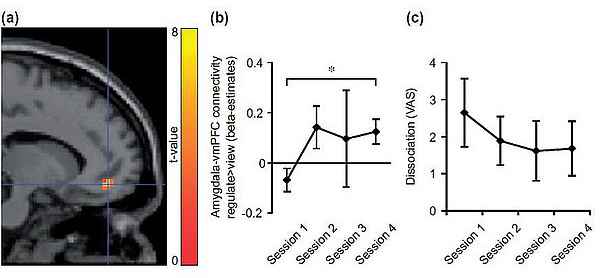Sie befinden sich hier
Inhalt

Medical Director – Clinic for Psychosomatic and Psychotherapeutic Medicine
Central Institute of Mental Health
Professor of Psychosomatics and Psychotherapeutic Medicine, Heidelberg University
At the centre of the department's research is the psychopathology of stress-related disorders (in particular borderline personality disorder and post-traumatic stress disorder) and psychotherapeutic interventions derived from the knowledge of these mechanisms. Our aim is to gain a better understanding of dysfunctional emotional regulation and social interaction as well as the influence of stress on cognitive processes.
In particular, we use methods of experimental psychopathology, i.e. the modelling of pathomechanisms in behavioural experiments and their investigation with methods of imaging, peripheral physiology and neurochemistry. An example of our work is the investigation of the mechanism of self-injurious behaviour, which focuses on studies of pain processing as well as emotion regulation. From the understanding of these pathomechanisms new psychotherapeutic interventions are being developed, such as real-time MRI-supported neurofeedback.
Another research focus is the investigation of the effects of psychotherapy with neurobiological methods, e.g. by studying emotion regulation before and after psychotherapy with functional neuroimaging.
Central research topics:
- To improve multimodal treatments for borderline personality disorder and posttraumatic stress disorder
- To develop and test innovative therapeutic approaches for stress- and trauma-related disorders, such as real-time fMRI neurofeedback
- To elucidate psychopathology mechanisms, e.g. of non-suicidal self-injury, interpersonal dysfunction or dissociation

National and international joint research projects
DFG: TRR 379 “Neuropsychobiology of Aggression”. Duration: 2024 – 2028
- Subproject A03 (together with G. Ende): “Modulation of aggression by acute threat”
DFG: “Brain Signal Training to Enhance Affect Down-Regulation (BrainSTEADy)”. Duration: 2023 – 2025, coordinator
AE Foundation: A Neurofeedback Booster for Emotion Regulation Therapy (BrainBoost). Duration: 2020 – 2022
DFG: RTG 2350 "Impact of Adverse Childhood Experiences on Psychosocial and Somatic Conditions Across the Lifespan" Duration: 2018 – 024, coordinator
BMBF: “Self-Injury: Treatment, Assessment, Recovery” (STAR consortium). Duration: 2018 – 2022
- Subproject STAR NEURO. The STAR NEURO subproject aims to identify biological markers of non-suicidal self
Selected publications
- Differential methylation of OPRK1 in borderline personality disorder is associated with childhood trauma.
Gescher DM, Schanze D, Vavra P, Wolff P, Zimmer-Bensch G, Zenker M, Frodl T, Schmahl C. (2024) Mol Psychiatry. Online ahead of print. - Severity of type and timing of retrospectively reported childhood maltreatment on female amygdala and hippocampal volume.
Herzog JI, Thome J, Demirakca T, Koppe G, Ende G, Lis S, Rausch S, Priebe K, Müller-Engelmann M, Steil R, Bohus M, Schmahl C. (2020) Scientific Reports. 10(1):1903. - The glutamate to GABA ratio in the posterior insula is associated with pain perception in healthy women but not in women with borderline personality disorder.
Gradinger T, Sack M, Cardinale V, Thiaucourt M, Baumgärtner U, Schmahl C, Ende G. (2019) Pain. 160:2487-2496. - Assessing the marks of change: how psychotherapy alters the brain structure in women with borderline personality disorder.
Mancke F, Schmitt R, Winter D, Niedtfeld I, Herpertz SC & Schmahl C. (2018) Journal of Psychiatry and Neuroscience. 43:171-181. - Dissociation in psychiatric disorders – a meta-analysis of studies using the Dissociative Experience Scale.
Lyssenko L*, Schmahl C*, Weidner L, Vonderlin R, Bohus M & Kleindienst N. (2018) American Journal of Psychiatry. 175,:37-46. *Both authors contributed equally - Alterations of amygdala-prefrontal connectivity with real-time fMRI neurofeedback in BPD Patients.
Paret C, Kluetsch R, Zaehringer J, Ruf M, Demirakca T, Bohus M, Ende G & Schmahl C. (2016) Social Cognitive and Affective Neuroscience. 11:952-960. - Neural correlates of disturbed emotion processing in borderline personality disorder: A multimodal meta-analysis.
Schulze L, Schmahl C & Niedtfeld I. (2016) Biological Psychiatry 79(2), 97-106. - Impulsivity and aggression in female BPD and ADHD patients: association with ACC glutamate and GABA concentrations.
Ende G, Cackowski S, Van Eijk J, Sack M, Demirakca T, Kleindienst N, Bohus M, Sobanski E, Krause-Utz A & Schmahl C. (2015) Neuropsychopharmacology. 41(2):410-418. - Incision and stress regulation in borderline personality disorder: neurobiological mechanisms of self-injurious behaviour.
Reitz S, Kluetsch R, Niedtfeld I, Knorz T, Lis S, Paret C, Kirsch P, Meyer-Lindenberg A, Treede RD, Baumgärtner U, Bohus M & Schmahl C. (2015) British Journal of Psychiatry. 207(2):165-172. - Affect regulation and pain in borderline personality disorder: a possible link to the understanding of self-injury.
Niedtfeld I, Schulze L, Kirsch P, Herpertz SC, Bohus M & Schmahl C. (2010) Biological Psychiatry. 68(4):383-391.
Photo Credits: #1 Zentralinstitut für Seelische Gesundheit
Kontextspalte
Contact
Central Institute of Mental Health
J 5
68239 Mannheim
Phone +49 621 1703-4002
christian.schmahl@zi-mannheim.de
